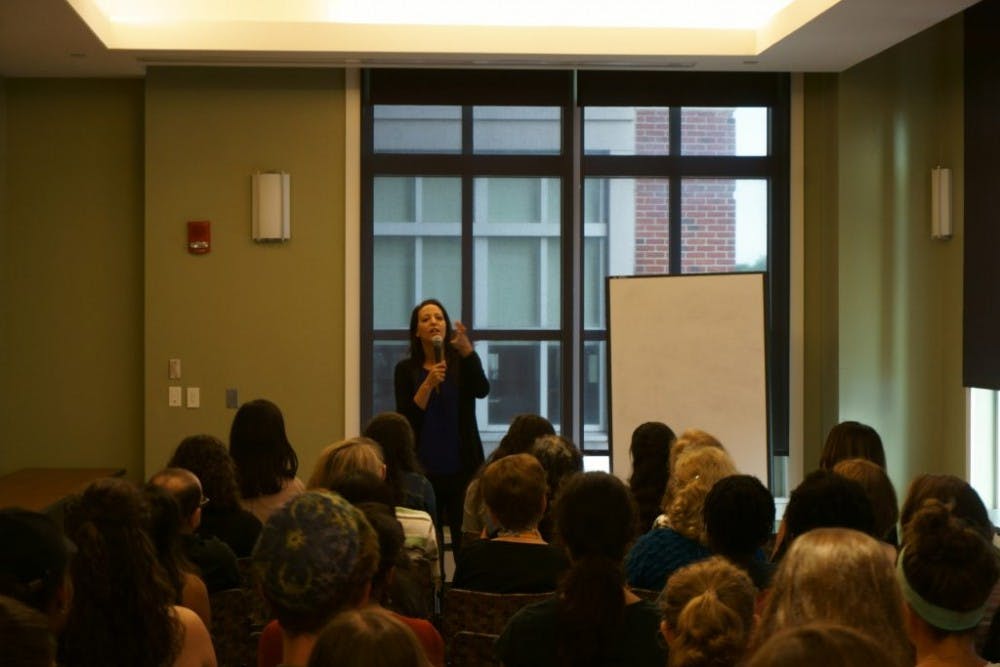Best-selling Israeli author Lihi Lapid gave a talk titled “The Evolving Definition of the Modern Woman” on Wednesday, Sept. 21 in Charles Commons, co-organized by the Coalition of Hopkins Activists for Israel (CHAI) and Hopkins Hillel. Lapid has published three novels and writes a weekly newspaper column about women’s lives and their experiences juggling multiple roles.
Lapid was also in Baltimore to accept the Pamela Claman Leadership Award at the Jewish Women’s Renaissance Project (JWRP), which ran from Sept. 18 to Sept. 20 in College Park. The Pamela Claman Leadership Award is given to those who have significantly shaped the Jewish world with their inspired leadership and for serving as an international role model to Jewish women around the world.
Lapid latest book, Woman of Valor, combines her personal experiences as a career woman and mother, with actual letters she has received in the past from readers of her column. Lapid’s talk largely drew from these experiences, as she examined her professional and personal life and attempted to unpack the evolving roles of women in contemporary society.
Lapid interwove cultural and historical anecdotes about women’s history in Israel and beyond during her talk. She also shared some of the wisdom she had gained from her experience as a photojournalist, a wife of a prominent Israeli politician and a mother of a soldier and an autistic child.
“You remember the first time you resigned,” Lapid said. “You will have more moments like that—those moments that you realize that you have a baby. The moment that you will hear him cry in the other room and you say that I’m not getting up and throw a blanket over your head. In those moments, you will realize that you have more strength than you think.”
Lapid first began her professional life as an army photographer, following her mandatory service in the military. Her job took her to Rwanda during the Rwandan Genocide in 1994. Upon her return, she gave birth to her first child, which required her to take six months of bedrest. During this time, she voiced doubts about a career that required her to go to airplanes and pack 20 kilos of equipment with her.
“I sat there for six months seeing everybody photograph where I was supposed to photograph,” she said. “No one is looking for a photographer who wants to breastfeed for four hours a day.”
At this time, she attended a number of panels and television shows on women’s issues. Lapid noticed that although many women attended these panels, very few of them actually spoke out at the event. According to Lapid, these women did not want to publicly share how much they knew about a topic.
“Women don’t want to say, ‘I know a lot about this and I can talk about it’” she said.
Lapid then elaborated by sharing a personal anecdote. While she was on a panel, a man had once asked her why she had decided to attend. When Lapid responded by saying because she was a feminist, he responded with, “You aren’t showing it.”
Lapid also pointed to her mother and grandmother as role models who set the foundation for women in modern Israel. She noted that during her mother’s generation, there was the prominence of latchkey kids in Israel, kids who returned to home alone after school due to working parents. It originated during World War II, as female participation in the workforce increased.
Lapid ended her talk by urging women to be themselves, love themselves and find compromise and common ground. She also expressed hopes that in the future it will become normal for women to freely pursue their own work.
“Being a working mother is a very new thing,” Lapid said. “The generation of our mothers was the first to go out of their house. My mother wanted us to have everything she didn’t have.”
Lior Mass, an Israeli citizen who took a year off to do volunteer work before military service, helped facilitate the event. She appreciated Lapid’s honest and unobtrusive speaking style.
“I enjoyed the way she spoke to us directly,” Mass said. “It was very authentic. She had a very interesting life and it was a big honor for her to be here.”
Junior Daphna Varadi, co-president of CHAI, spoke to the relatability of Lapid’s talk.
“She was great,” Varadi said. “She spoke about how amazing it is that today moms can work without the stigma of when she was growing up. The fact that her mom worked was basically embarrassing when she was a kid, but she emphasized how important it is for women to do what they want today: be a full time mom, work part time, or not work at all. She also incorporated being a mom in Israel, with a kid in the army and being a wife to a high profile politician, but still made it relatable to Americans.”
Lapid has written three books about her journey through life and motherhood, Woman of Valor, Secrets from Within, and I Can’t Always Be Wonderful, as well as a bestselling children’s book. Although Lapid writes in her native Hebrew, she does her own translating and her most recent book is available in English.





